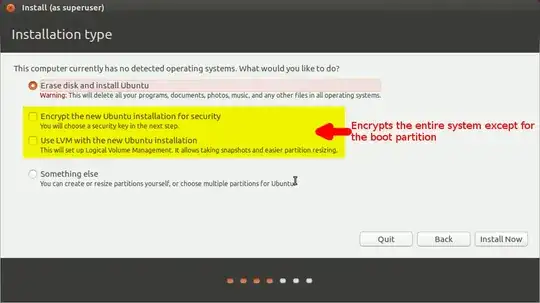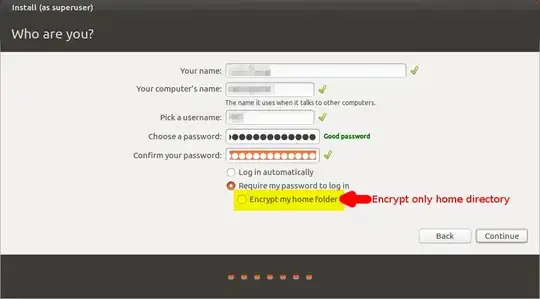I am unable to access my Ubuntu 16.04 files from my Windows 10 OS, because I had enabled encryption during installation. Is there a way I can decrypt and use my files from Windows? Else, my plan is to reinstall Ubuntu from a LiveUSB.
Before doing so, I plan to remove my Lenovo (D:) partition (since I have separate recovery media and don't plan to use Lenovo OneKey Recovery) which is about 20 Gb. I want to dedicate this space for the root partition, and reallocate the current root partition space to creating a separate home partition. Finally, I plan to increase my Linux swap space form 6 Gb to 18 Gb.
I plan to back up my files before doing all this of course (creating disk images, etc.). Could doing all this affect my files, installed packages, and 3rd party software?


awk '$3 == "ecryptfs"' /proc/mountsand for LUKS/dm-crypt with a look into/etc/crypttab(as super-user). Those are the options for the encryption set up during Ubuntu installation. – David Foerster Mar 28 '17 at 08:37awk '$3 == "ecryptfs"' /proc/mounts. Then runsudo cat /etc/crypttab. If the first command returns something, then you encrypted your home partition. If the second command returns something other than file not found, then you encrypted your whole system. – b_laoshi Mar 30 '17 at 02:59CRYPTDISK UUID=YOUR-PARTITION-UUID none luksandPATH-TO-ENCRYPTED-HOME /home ecryptfs MOUNT-OPTIONS– b_laoshi Mar 31 '17 at 08:51awk '$3 == "ecryptfs"' /proc/mounts/home/halcyon/.Private /home/halcyon ecryptfs rw,nosuid,nodev,relatime,ecryptfs_fnek_sig=8e8dd57cb6f2732f,ecryptfs_sig=59806262b6b3090c,ecryptfs_cipher=aes,ecryptfs_key_bytes=16,ecryptfs_unlink_sigs 0 0– halcyon Mar 31 '17 at 09:19sudo cat /etc/crypttab.......
– halcyon Mar 31 '17 at 09:24#cryptswap1 UUID=530c176d-f4d9-4d88-a84c-3c35805b7902 /dev/urandom swap,cipher=aes-cbc-essiv:sha256As an aside, I'm going out of town soon so won't have time (before the bounty expires) to work on the decryption then using Ext2read. Hopefully your advice works! Regardless, you've been super helpful. I'll mark yours as best answer so you get the bounty.
– halcyon Apr 02 '17 at 08:28{}button in the editor toolbar) will be much more readable there; alternatively you can use a pastie service for longer listings and include the link of your pastie in your question. Overall it’s best to have everything relevant in one place. Additionally, comments may be deleted for various reasons. Thanks. – David Foerster Apr 02 '17 at 18:49